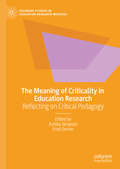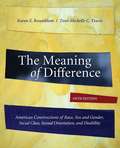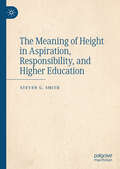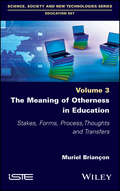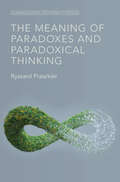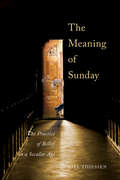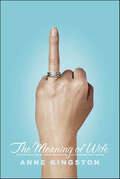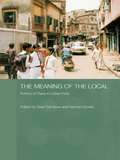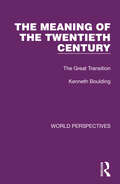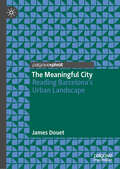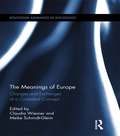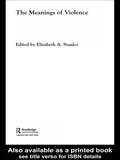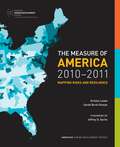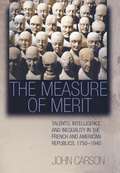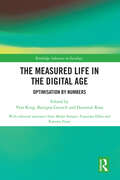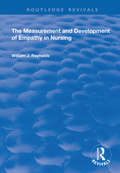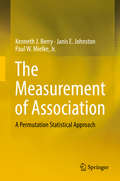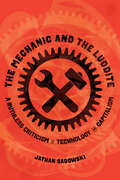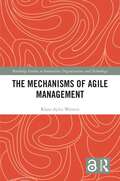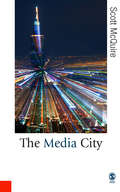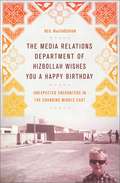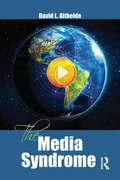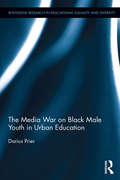- Table View
- List View
The Meaning of Criticality in Education Research: Reflecting on Critical Pedagogy (Palgrave Studies in Education Research Methods)
by Fred Dervin Ashley SimpsonThis book explores, and problematizes, what it means to be ‘critical’ in education research. Drawing together chapters from diverse global perspectives, this volume aims to stimulate dialogue about possible meanings of criticality in education research. In doing so, they question why criticality has become such an essential part of education, and what researchers expect of it. The book opens up and contests some of the deficiencies of criticality in education research: ultimately it is not a global term, but often creates a false binary between East and West. Offering an alternative trajectory to educational narratives surrounding criticality, this book will be of interest and value to scholars of critical pedagogy and comparative education.
The Meaning of Difference: American Constructions of Race, Sex and Gender, Social Class, Sexual Orientation, and Disability (5th Edition)
by Karen E. Rosenblum Toni-Michelle C. TravisThe Meaning of Difference focuses on the social construction of difference as it operates in American formulations of race and ethnicity, sex and gender, social class, sexual orientation, and disability. The conceptual structure of this text-reader comes from four framework essays addressing the construction of difference, the experience of difference, the social meaning of difference, and social action that might bridge differences. Each framework essay is followed by a set of readings selected for readability, conceptual depth, and applicability to a variety of statuses. Boxed inserts throughout offer first-person accounts from real people, many of them students. This edition features an expanded focus on disability and 29 new readings, including articles on how immigration is transforming the nature of American race and ethnic categories, the changing shape of higher education, and the experience of Americans of Middle-Eastern descent.
The Meaning of Height in Aspiration, Responsibility, and Higher Education
by Steven G. SmithThe Meaning of Height takes seriously the traditional figure of “higher life” for intrinsically preferable manners of living. Reworking the Platonic model of ascent to the ideal and descent to responsible engagement with the world, The Meaning of Height lays out concrete possible itineraries of reaching (upward to new acquisitions of personal capacity) and righting (downward from prompts for good order), showing connections between individual and social fulfillment. By focusing on our diversely demanding encounters with the interesting, the important, and the transcendent, the book strikes a counterpoint to the commonly homogenized conception of personal “happiness.” It also counters illiberal views of higher education with a Humboldtian vitality argument for a meaningfully “high” higher education geared to full development of human faculties, a level of education to which the disciplines of philosophy and religious studies make essential contributions. The book concludes by considering the essential role of this sort of higher education in democratic societies.
The Meaning of Otherness in Education: Stakes, Forms, Process, Thoughts and Transfers
by Muriel BriançonThe notion of otherness, often misused, requires important conceptualization work in order for it to be considered in all of its forms, and not simply reduced to the account of others. Although otherness certainly questions the link to the other (relation), it also questions the link to the self (reflexivity) and the link to knowledge (epistemology). Being tridimensional, the process of otherness is a paradox, the meaning of which can only be drawn thanks to ethics, psychoanalytical orientation and the history of philosophical ideas. This book, which relates to philosophy of education, seeks to explain the problematic notion of otherness, the desire for which is specific to humankind. It examines how otherness questions the limits of knowledge, transmission and language, and argues that it is in fact a value, a tool and practice for all the actors involved in the relationship between education, knowledge and care.
The Meaning of Paradoxes and Paradoxical Thinking (Cambridge Series on Possibility Studies)
by Ryszard PraszkierThis interdisciplinary work offers a comprehensive analysis of paradoxes and paradoxical thinking, exploring their manifestations in philosophy, societal dynamics, personality, and neuroscience. Demonstrating various methods for the augmentation of creativity and improved performance, this book uniquely integrates theoretical perspective with case studies and practical applications. As such it elucidates the theory and mechanisms of transforming the apparently impossible into the possible, illustrated by cases of social innovators successfully addressing insurmountable challenges. Aimed at graduate and postgraduate social science students and scholars, with over 500 bibliographical references, the text remains accessible to a broader audience due to its engaging language. Emphasizing the significance of paradoxes and paradoxical thinking in both professional and everyday contexts, it provides a nuanced exploration of paradoxical phenomena, making it a valuable resource for academic and general readers alike.
The Meaning of Sunday
by Joel ThiessenFewer Canadians identify with a religion, believe in a god, or attend weekly religious services than in past decades. What explains higher and lower levels of religiosity? Is secularization a myth or reality? What impact does religiosity or secularity have on a society's social and civil fabric? In The Meaning of Sunday, Joel Thiessen addresses these questions by weaving together narratives from interviews with members of both religious and secular communities. Exploring the meanings and motivations behind people's religious beliefs and behaviours, the book features discussions with three groups of people: those who attend religious services weekly, those who attend services mainly for religious holidays and rites of passage, and those who do not identify with any religious group and never attend religious services. Interview responses show that religiosity levels correlate to one's personal experiences with the supernatural, religious organizations, and social ties with those who either encourage or discourage religious identification, belief, or practice. Concluding that the demand for religion is waning regardless of what religious groups include in their programs, Thiessen suggests that, apart from some initial social and civic concern, Canadian society may be just fine without it. Testing two dominant theories in the sociology of religion - secularization and rational choice theory - The Meaning of Sunday provides in-depth qualitative research on people's "lived religion" and contributes to a major ongoing debate concerning the nature and importance of religion in contemporary society.
The Meaning of Sunday: The Practice of Belief in a Secular Age
by Joel ThiessenFewer Canadians identify with a religion, believe in a god, or attend weekly religious services than in past decades. What explains higher and lower levels of religiosity? Is secularization a myth or reality? What impact does religiosity or secularity have on a society’s social and civil fabric? In The Meaning of Sunday, Joel Thiessen addresses these questions by weaving together narratives from interviews with members of both religious and secular communities. Exploring the meanings and motivations behind people’s religious beliefs and behaviours, the book features discussions with three groups of people: those who attend religious services weekly, those who attend services mainly for religious holidays and rites of passage, and those who do not identify with any religious group and never attend religious services. Interview responses show that religiosity levels correlate to one’s personal experiences with the supernatural, religious organizations, and social ties with those who either encourage or discourage religious identification, belief, or practice. Concluding that the demand for religion is waning regardless of what religious groups include in their programs, Thiessen suggests that, apart from some initial social and civic concern, Canadian society may be just fine without it. Testing two dominant theories in the sociology of religion - secularization and rational choice theory - The Meaning of Sunday provides in-depth qualitative research on people's "lived religion" and contributes to a major ongoing debate concerning the nature and importance of religion in contemporary society.
The Meaning of Wife: A Provocative Look at Women and Marriage in the Twenty-First Century
by Anne Kingston"One part The Beauty Myth . . . and one part Backlash"*--a provocative exploration of who and what a wife really is.There is a wife crisis in North America, a brewing storm of conflicting forces swirling around what it means to be a wife at the beginning of the 21st Century. The word is so fraught with ambiguity that it has become a litmus test, eliciting from women emotions ranging from longing to antipathy, anxiety to derision. This crisis is at the heart of Anne Kingston's The Meaning of Wife.Delving into the complex, troubling, and sometimes humorous contradictions, illusions, and realities of contemporary wifehood, Kingston takes the reader on a fascinating journey into the wedding industrial complex, which elevates the bride to a potent consumer icon; through the recent romanticization of domesticity; and across the conflicted terrain of wifely sexuality. She looks at "wife backlash," and the new wave of neo-traditionalism that urges women to marry before their "best-before" dates expire; explores the apotheosis of abused wives and the strange celebration of wives who kill; and muses on the fact that Oprah Winfrey and Martha Stewart, two of the world's wealthiest and most influential women, are both non-wives whose success has hinged on thier understanding of wives. The result is an entertaining mix of social, sexual, historical, and economic commentary that is bound to stir debate even as it reframes our view of both women and marriage.
The Meaning of the Local: Politics of Place in Urban India
by Geert De Neve Henrike DonnerBy zooming in on urban localities in India and by unpacking the 'meaning of the local' for those who live in them, the ten papers in this volume redress a recurrent asymmetry in contemporary debates about globalisation. In much literature, the global is associated with transnationalism, dynamism and activity, and the local with static identities and history. Focusing on a range of locales in India's metropolitan areas and provincial small towns, the contributions move beyond the assertion that space is socially constructed to explore the ways in which social and political relations are themselves spatially and historically contingent. Using detailed ethnography, the authors highlight the vitality of place-making in the lives of urban dwellers and the centrality of a 'politics of place' in the production of power, difference and inequality. The volume illustrates how urban spaces are increasingly interconnected through wider social and spatial processes, while local boundaries and group-based identities are at the same time reconstructed, and often even consolidated, through the use of 'traditional' idioms and localised practices. All contributions relate detailed case studies of everyday activities to a range of contemporary debates that highlight various spatial aspects of cultural identities, economic restructuring and political processes in India. The volume provides an interdisciplinary perspective on urban life in rapidly changing political and economic environments. It offers a contribution to policy-orientated debates on urban livelihoods and urban planning as well as a wealth of ethnographic material for those interested in the spatial dimensions of urban life in India.
The Meaning of the Twentieth Century: The Great Transition (World Perspectives #2)
by Kenneth BouldingOriginally published in 1965 and written by a noted economist and leader in the field of conflict resolution, this book traces the forces which have brought the 20th century ‘post-civilisation’ into being: the ever-increasing power of science and the scientific attitude, the global communication network, the high efficiency of industrial societies. New conditions pointed to a life of ease but also enormous problems. The book discusses how though our technical resources have become immense, social and psychological conflicts remain. The author’s training in psychology and economics combines with a deep sense of history to create a book which is as relevant now as when it was first published.
The Meaningful City: Reading Barcelona’s Urban Landscape
by James DouetThis book presents a new way of examining cities to reveal the many and varied meanings which are written into urban landscapes. As the title suggests, urban areas are full of messages and communications, with signs and symbols incorporated into buildings, structures and plans. Taking the rich architectural and urbanistic chronicle of Barcelona as a model, the author shows how different social groups, consciously and unconsciously, have written their values and interests on to the city. The narrative opens with the forced reshaping by military engineers of the former capital of Catalunya after 1714, and extends up to an analysis of the many competing actors and agencies which attempt to impose their perspectives on the contemporary city. It scrutinizes how deep cultural and social changes such as the Enlightenment, Romanticism, the Industrial Revolution, de-industrialisation and globalisation can be read in the urban environment, as well as more intentional effects of major urban development projects including the Ciutadella fortress, the Rambles, the universal exhibitions of 1888 and 1929, the Sagrada Família, the Barcelona Model of urban renewal, the 22@ innovation district and the superil·les sustainability plans. Informed by the approach of critical urban studies, the narrative is written in a clear style to engage readers with many different interests, students, urbanists and design professionals as well as residents and visitors to the city. Drawing on research from varied academic fields published in English, Catalan and Spanish, it is illustrated with colour photographs of many of the buildings and sites that have made Barcelona a global resource for understanding contemporary cities.
The Meanings of Europe: Changes and Exchanges of a Contested Concept (Routledge Advances in Sociology #118)
by Claudia Wiesner Meike Schmidt-GleimWhat is Europe? What are the contents of the concept of Europe? And what defines European identity? Instead of only asking these classical questions, this volume also explores who asks these questions, and who is addressed with such questions. Who answers the questions, from which standpoints and for what reasons? Which philosophical, historical, religious or political traditions influence the answers? This book addresses its task in three parts. The first concentrates on the controversies around the meaning of Europe. The second focuses on the role of the European Union. The third discusses Europe and its relations to different types of otherness, or rather, non-European-ness. The volume produces a complex and plural picture of the concepts, ideas, debates and (ex)changes associated with the concept of Europe, and has a clear significance for today’s debates on European identity, Europeanization, and the EU.
The Meanings of Violence
by Elizabeth A. StankoThe media often makes sense of violence in terms of 'randomness' and 'evil'. But the reality, as the contributors to The Meanings of Violence demonstrate, is far more complex. Drawing on the diverse subject matter of the ESRC's Violence Research Programme - from interviews with killers to discussions with children in residential facilities - this volume locates the meaning of violence within social contexts, identities and social divisions. It aims to break open our way of speaking about violence and demonstrate the value in exploring the multiple, contradictory and complex meanings of violence in society. The wide range of topics include:*Prostitute and client violence *Violence amongst young people at school and on the streets *Violence in bars and nightclubs *Violence in prison *Racist and homophobic violenceThis book will be fascinating reading for students of criminology and academics working in the field of violent crime.
The Measure of America, 2010-2011: Mapping Risks and Resilience (Social Science Research Council #9)
by Kristen Lewis Sarah Burd-SharpsThe Measure of America, 2010-2011, is the definitive report on the overall well-being of all Americans. How are Americans doing—compared to one another and compared to the rest of the world? This important, easy-to-understand guide will provide all of the essential information on the current state of America.This fully illustrated report, with over 130 color images, is based on the groundbreaking American Human Development Index, which provides a single measure of the well-being for all Americans, disaggregated by state and congressional district, as well as by race, gender, and ethnicity. The Index rankings of the 50 states and 435 congressional districts reveal huge disparities in the health, education, and living standards of different groups. For example, overall, Connecticut ranked first among states on the 2008-2009 Index, and Mississippi ranked last, suggesting that there is a 30-year gap in human development between the two states. Further, among congressional districts, New York’s 14th District, in Manhattan, ranked first, and California’s 20th District, near Fresno, ranked last. The average resident of New York’s 14th District earned over three times as much as the average resident of California’s 20th District, lived over four years longer, and was ten times as likely to have a college degree.The second in the American Human Development Report series, the 2010-2011 edition features a completely updated Index, new findings on the well-being of different racial and ethnic groups from state to state, and a closer look at disparities within major metro areas. It also shines a spotlight on threats to progress and opportunity for some Americans as well as highlighting tested approaches to fosteringresilience among different groups.Using a revelatory framework for explaining the very nature of humanprogress, this report can be used not only as a way to measure America but also to build upon past policy successes, protect the progress made over the last half century from new risks, and create an infrastructure of opportunity that can serve a new generation of Americans. Beautifully illustrated with stunning four-color graphics that allow for a quick visual understanding of often complex but important issues, The Measure of America is essential reading for all Americans, especially for social scientists, policy makers, and pundits who want to understand where Americans stand today.
The Measure of Merit: Talents, Intelligence, and Inequality in the French and American Republics, 1750-1940
by John CarsonCarson tells the fascinating story of how two nations wrestled scientifically with human inequalities and their social and political implications. Surveying an array of political tracts, philosophical treatises, scientific works, and journalistic writings, he chronicles the gradual embrace of the IQ version of intelligence in the U.S., while in France, the birthplace of the modern intelligence test, expert judgment was consistently prized above such quantitative measures.
The Measured Life in the Digital Age: Optimisation by Numbers (Routledge Advances in Sociology)
by Hartmut Rosa Vera King Benigna Gerisch Maike Stenger Franziska Elfers Ramona FranzThis book examines both the productive and counterproductive dimensions of the increasing orientation towards digital figures.Building on findings of the transdisciplinary research project "The Measured Life", the book explores the social, cultural and psychological implications of digital optimisation. The study focuses on its effects across work and organisations, relationships in social media and bodily measurement practices such as self-tracking. Based on in-depth research, the authors analyse the connections between society and the individual, culture and psyche. The spheres investigated reveal incentives and risks embodied by digital technology that indicate shifts taking place in the culturally defined relations between social and individual pathology and normality.With new theoretical perspectives and methodological approaches, The Measured Life in the Digital Age appeals to scholars in sociology, social theory, cultural studies and psychoanalysis, as well as anyone seeking to understand how digital optimisation influences our society, relationships and sense of self.
The Measurement and Development of Empathy in Nursing (Routledge Revivals)
by William J ReynoldsThis title was first published in 2000: Empathy is known to be crucial to helping relationships, but professional helpers, including nurses, do not normally display much empathy as it has not been measured in clients' terms and accordingly taught. This text examines a study in which a client-centred empathy scale was developed - the client-centred measure of empathy was found to be reliable and valid and a course designed to teach nurses to offer empathy in clients' terms was effective. The findings of the study have implications for the future design of nurse eduction and the goals of the health service.
The Measurement of Association: A Permutation Statistical Approach
by Kenneth J. Berry Janis E. Johnston Paul W. Mielke<p>This research monograph utilizes exact and Monte Carlo permutation statistical methods to generate probability values and measures of effect size for a variety of measures of association. Association is broadly defined to include measures of correlation for two interval-level variables, measures of association for two nominal-level variables or two ordinal-level variables, and measures of agreement for two nominal-level or two ordinal-level variables. Additionally, measures of association for mixtures of the three levels of measurement are considered: nominal-ordinal, nominal-interval, and ordinal-interval measures. Numerous comparisons of permutation and classical statistical methods are presented. <p>Unlike classical statistical methods, permutation statistical methods do not rely on theoretical distributions, avoid the usual assumptions of normality and homogeneity of variance, and depend only on the data at hand. This book takes a unique approach to explaining statistics by integrating a large variety of statistical methods, and establishing the rigor of a topic that to many may seem to be a nascent field. This topic is relatively new in that it took modern computing power to make permutation methods available to those working in mainstream research. <p>Written for a statistically informed audience, it is particularly useful for teachers of statistics, practicing statisticians, applied statisticians, and quantitative graduate students in fields such as psychology, medical research, epidemiology, public health, and biology. It can also serve as a textbook in graduate courses in subjects like statistics, psychology, and biology.</p>
The Mechanic and the Luddite: A Ruthless Criticism of Technology and Capitalism
by Dr. Jathan SadowskiThis short book demystifies how the two systems of technology and capitalism work together and equips readers with practical tools to dismantle them and build a better world, bit by bit. Our society is constantly made to serve the needs of two systems: technology and capitalism. Neither exists outside humans, but both are treated as above and beyond us. The Mechanic and the Luddite offers the critical tools needed to deconstruct these systems—how they work, whom they work for, and what work they do in our lives. With signature style and energy, Jathan Sadowski presents a provocative one-stop shop for understanding the political economy of technology and capitalism. Each chapter breaks down key features of technological capitalism, offering sharp, synthetic, and authoritative analysis of topics like innovation, labor, data, and risk. It's not enough to know how the machinery of capitalism is put together and how its parts operate; we must also know whom the machines serve and when they should be taken apart, to be rebuilt for new purposes or destroyed for good. The Mechanic and the Luddite provides the political guidance needed to make these crucial decisions.
The Mechanisms of Agile Management (Routledge Studies in Innovation, Organizations and Technology)
by Klara-Aylin WentenThis book is about the underlying mechanisms of agile management that control work processes in the context of industrial tech development. It challenges commonly held beliefs in adaptability, collaboration and flattened hierarchies claimed to be achieved by agile approaches. In asking how these promises are put into practice, this book offers novel insights into how work is controlled in times of increasing flexibility and constant change in the world of work and management.Through a rich analysis of a case study in industrial tech companies, Klara‑Aylin Wenten argues that agility is deeply entrenched in ambivalences ranging between planning and improvising, caring and exploiting, intimacy and professional distance, accuracy and imperfection and autonomy and control. She illuminates the challenging expectations and invisible work efforts that employees are faced with to adhere to the promise of agility. In introducing the concept of ‘management scripts’, the author sheds light on how action patterns, work habits, roles, interactions or artifacts embed (unspoken) guidelines instructing and controlling employees’ daily work lives. This lens on scripts challenges conventional management theories and highlights the pivotal role of material objects in work control. This book thus extends our understanding of the heterogeneity of humans and nonhumans contributing to the dynamics of managerial control, even beyond the scope of agile methodologies.This book appeals to an academic audience ranging from the humanities and social sciences to more practice‑based disciplines in management and business. As a research monograph, this book is predominantly dedicated to academic scholars in the fields of Science and Technology Studies, organization and management studies and the sociology of work but also addresses practitioners and scholars interested in business, innovation, design, anthropology or cultural studies.Chapter 1 of this book is freely available as a downloadable Open Access PDF at http://www.taylorfrancis.com under a Creative Commons Attribution-Non Commercial-No Derivatives (CC-BY-NC-ND) 4.0 license.
The Media City: Media, Architecture and Urban Space (Published in association with Theory, Culture & Society)
by Dr Scott Mcquire"If only more new media commentators had this level of historical-critical reference, engaging, good stories, and a degree of wonder at what media and windows bring to the city, to life." - John Hutnyk, Goldsmiths, University of London "Just when you thought the last word had been said about cities and media, along comes Scott McQuire to breathe new life into the debate. When revisiting existing pathways, his always ingenious eyes produce startling and original insights. When striking out into new territory, he opens up before us inspiring new vistas. I love this book." - James Donald, University of New South Wales "A book that crams into a single chapter more insights and illustrations than seems feasible, yet which ties all threads together through a consistent, theoretically rich analysis of the interplay of media and city... Writing with effusiveness uncharacteristic of back-cover blurbs on academic tomes, James Donald says 'I love this book'. But I will end by echoing his praise, and make a promise to readers: you will love The Media City, too." - European Journal of Communication "Refreshingly clear, getting to grips with some of the key concepts of urban sociology in a way that moves beyond the wistful evocation and splatter of undigested terms that characterises so much academic writing on culture and cities." - Media, Culture & Society Significant changes are occurring in the spaces and rhythms of contemporary cities and in the social functioning of media. This forceful book argues that the redefinition of urban space by mobile, instantaneous and pervasive media is producing a distinctive mode of social experience. Media are no longer separate from the city. Instead the proliferation of spatialized media platforms has produced a media-architecture complex - the media city. Offering critical and historical analysis at the deepest levels, The Media City links the formation of the modern city to the development of modern image technologies and outlines a new genealogy for assessing contemporary developments such as digital networks and digital architecture, web cams and public screens, surveillance society and reality television. Wide-ranging and thoughtfully illustrated, it intersects disciplines and connects phenomena which are too often left isolated from each other to propose a new way of understanding public and private space and social life in contemporary cities. It will find a broad readership in media and communications, cultural studies, social theory, urban sociology, architecture and art history. Winner of the 2009 Jane Jacobs Urban Communication Award, awarded by the Urban Communication Association.
The Media Relations Department of Hizbollah Wishes You a Happy Birthday: Unexpected Encounters in the Changing Middle East
by Neil MacfarquharWith his counterintuitive sense since his boyhood in Qadhafi's Libya that the Middle East, despite all the bloodshed in its recent history, is a place of warmth, humanity, and generous eccentricity, Neil MacFarquhar introduces a cross-section of unsung, dynamic men and women pioneering political and social change. The author interacts with Arabs and Iranians in their every day lives, removed from the violence we see constantly, yet wrestling with the region's future.
The Media Syndrome
by David AltheideOver the past 45 years, award-winning sociologist David L. Altheide has illuminated how media formats and media logic affect our understanding of social issues, of how political decisions are made, and of how we relate to each other. In this masterful, summative work, Altheide describes the media syndrome: how these factors shape our expectations of, and reactions to, both public and personal events. Ideal for courses on mass media and political communication, the book provides a detailed description of the media syndrome and its impact on daily life; uses historical and contemporary examples from Watergate to Edward Snowden; includes the changes in the ecology of communication from mass media to social media and its social impact.
The Media War on Black Male Youth in Urban Education (Routledge Research in Educational Equality and Diversity)
by Darius PrierNews media, film, and the music industry have become powerful sources of misrepresentation of Black male life in the social imagination of white society. The pedagogy of popular culture has important implications for educators and youth advocates who desire to challenge the myths and distortions that ultimately harm youth. This volume raises awareness of the media war on Black male youth in popular culture, and the impact this image battle has on the discriminatory treatment of the population in urban educational settings. Citing the recent controversial deaths of Trayvon Martin and Jordan Davis, the portrayal of black males in contemporary films, and the locus of hip-hop masculinities, this volume offers a unique framework for analyzing how contemporary image-making practices affect Black male youth in urban education. It also offers ethical considerations for educators in their critique, consumption and reading of Black male subjectivity in media, and provides avenues for practical applications of critical media literacy on the ground.
The Media and Me: A Guide to Critical Media Literacy for Young People
by Mickey Huff Andy Lee Roth Nolan Higdon Ben Boyington Allison T. ButlerFrom foundations in critical thinking skills to practical tools and real-life perspectives, this book empowers young adult readers to be independent media users.During the recent presidential election, &“media literacy&” became a buzzword that signified the threat media manipulation posed to democratic processes. Meanwhile, statistical research has shown that 8 to 18 year-olds pack more than eleven hours with some form of media into each day by &“media multitasking.&” Young people are not only eager and interested to learn about and discuss the realities of media ownership, production, and distribution, they also deserve to understand differential power structures in how media influences our culture.The Media and Me provides readers with the tools and perspectives to be empowered and autonomous media users. The book explores critical inquiry skills to help young people form a multidimensional comprehension of what they read and watch, opportunities to see others like them making change, and insight into their own identity projects. By covering topics like storytelling, building arguments and recognizing fallacies, surveillance and digital gatekeeping, advertising and consumerism, and global social problems through a critical media literacy lens, this book will help students evolve from passive consumers of media to engaged critics and creators.The Media and Me is a joint production of The Censored Press and Triangle Square Books for Young Readers.
